Disputing Your Criminal Background Check: Common Issues and Solutions
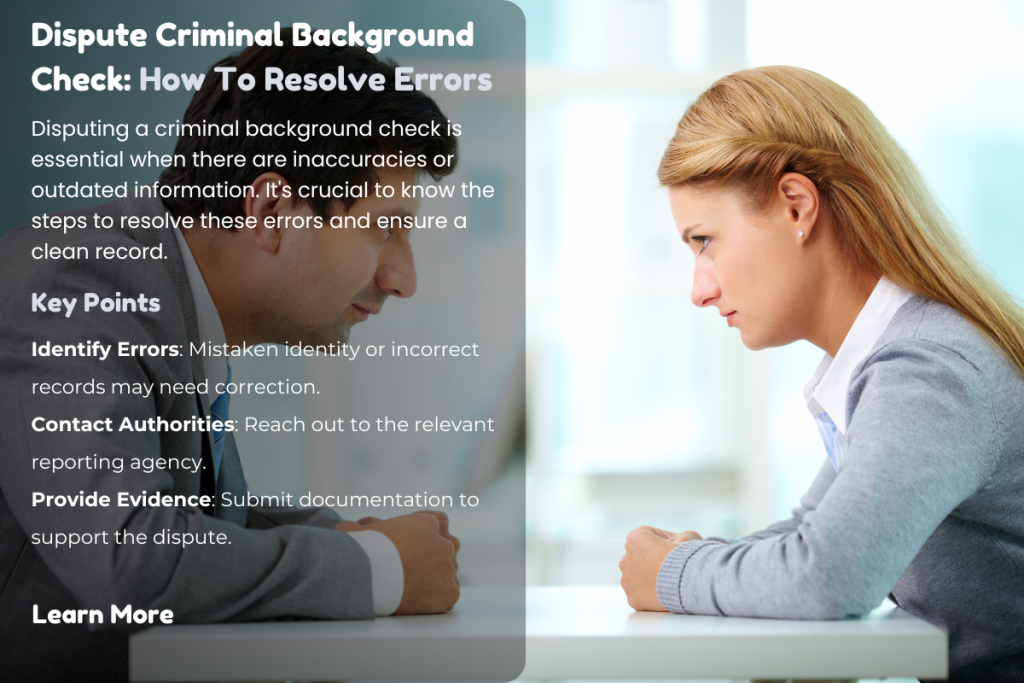
Understanding Criminal Background Checks and Dispute
A criminal background check is a process used by various organizations, such as employers, landlords, and financial institutions, to review an individual’s criminal history. These checks are conducted to determine if an individual has any prior convictions or legal issues that could impact their eligibility for a job, housing, or other services.
Criminal background checks can include a variety of records, including arrest records, convictions, pending charges, and other relevant legal data. The information is often pulled from law enforcement agencies, courts, and other governmental or private databases. The goal is to ensure that individuals do not pose a risk in professional, social, or legal environments.
For employers, criminal background checks are a crucial part of the hiring process. They help protect the company, employees, and clients by ensuring that new hires do not have a history that could compromise workplace safety, compliance, or company reputation. Similarly, landlords use background checks to verify that potential tenants do not have a history of criminal activity that could endanger other tenants or damage property.
While these checks are essential for security, accuracy is key. Any errors or inaccuracies in criminal background check reports can have serious consequences, from losing out on a job opportunity to facing legal disputes. This is why it is critical to understand the process of disputing a criminal background check when discrepancies arise.
Common Reasons for Disputing a Criminal Background Check
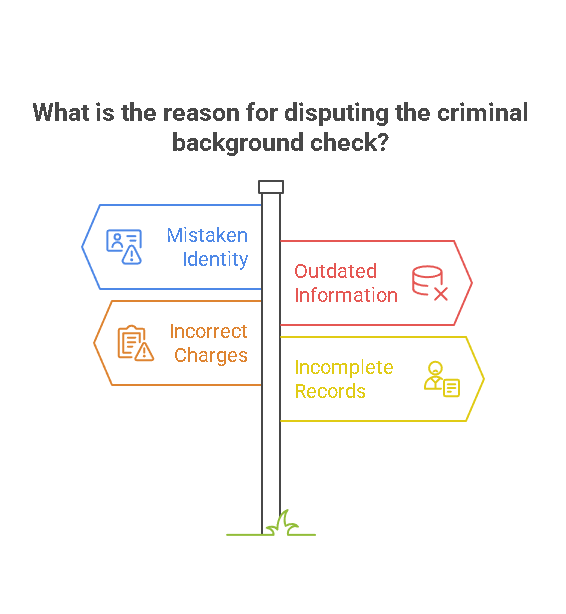
There are several reasons why an individual may dispute a criminal background check. Below are some of the most common issues that lead to disputes:
- Mistaken Identity: One of the most frequent causes of errors in criminal background checks is mistaken identity. This can occur when individuals with similar names, birthdates, or other identifying details are confused with each other. For example, if you share your name with someone who has a criminal record, their information might be incorrectly attributed to you.
- Outdated Information: Background checks may sometimes include outdated or incorrect records that have already been expunged or sealed by the court. For example, charges that were dismissed or convictions that have been overturned may still appear on the report if the information was not updated in the database.
- Incorrect Charges or Convictions: In some cases, the information on the criminal background check may be inaccurate. This can happen if the charge was wrongly recorded, the court documents were misinterpreted, or if there was an administrative error in the reporting process.
- Incomplete Records: A criminal background check may sometimes show an incomplete or incorrect list of charges or convictions. For instance, a person might have a single conviction listed multiple times or a conviction from a different state included in their report.
- Error in Case Status: Errors may also occur if the status of a case is listed incorrectly. For example, a case may be marked as “open” or “pending” when it has already been resolved or dismissed.
- Duplicate Records: Sometimes, background check reports include duplicate records for the same incident. This could be the result of an error during data entry or processing, leading to an inflated record of criminal history.
How to Start the Process of Disputing a Criminal Background Check
If you believe there is an error in your criminal background check, it’s important to act quickly and effectively. The process of disputing a criminal background check involves several key steps:
- Review Your Report: The first step in disputing a criminal background check is thoroughly reviewing the report. Check all the details, including personal information, charges, case statuses, and court records. Ensure that everything is accurate, especially your name, date of birth, and other identifiers.
- Gather Supporting Documents: If you notice any discrepancies, gather supporting evidence to show that the information in the report is inaccurate. This could include court documents, identification records, or any other relevant paperwork that verifies the information you are disputing.
- Contact the Reporting Agency: Reach out to the agency that provided the background check. This could be a government agency, a third-party background check company, or a credit bureau. Most agencies have a formal dispute process that allows individuals to file a claim when they believe there is incorrect information on their background check.
- Submit Your Dispute: Once you’ve gathered your evidence, follow the dispute process as outlined by the reporting agency. This may involve submitting a written complaint, providing supporting documentation, and outlining the specific errors you believe need to be corrected. In some cases, you may be able to file a dispute online or by phone.
- Follow Up: After submitting your dispute, follow up with the agency to ensure that your claim is being processed. Keep a record of all communications with the agency, including dates, names of representatives, and any case numbers.
- Wait for Resolution: Once a dispute is submitted, it typically takes time for the agency to investigate and resolve the issue. The timeline can vary depending on the complexity of the dispute and the agency’s internal processes. It may take anywhere from a few days to several weeks for the error to be corrected.
It’s important to note that while you can dispute errors in your criminal background check, the process is not always straightforward. In some cases, resolving the issue may require legal assistance or further investigation. Understanding your rights and how to proceed is crucial for successfully disputing a criminal background check.
Steps Involved in Disputing a Criminal Background Check
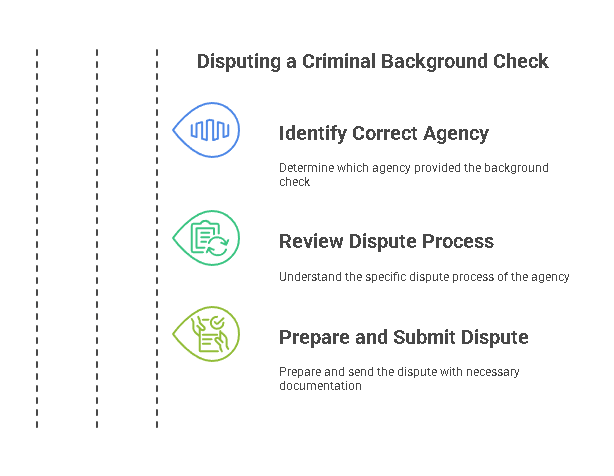
When disputing a criminal background check, it’s essential to follow a structured process to ensure that the issue is addressed properly. This involves not only contacting the correct parties but also making sure that all necessary evidence is provided, and any discrepancies are fully clarified. In this section, we will walk through the detailed steps of how to dispute a criminal background check, as well as provide guidance on how to ensure the dispute is handled efficiently.
How to File a Dispute with the Background Check Company
The first and most crucial step in the dispute process is to contact the company or agency that provided the criminal background check. This could be a third-party screening company, a credit bureau, or a government agency responsible for maintaining criminal records.
- Identify the Correct Agency: Before you can initiate a dispute, you must first determine which company or agency provided the background check. Background check services often pull data from various sources, including police records, court databases, and national criminal registries. Therefore, it’s important to know which organization is responsible for the error. This will typically be indicated on the report itself.
- Review the Agency’s Dispute Process: Every agency will have its own specific process for handling disputes. Some agencies allow you to submit disputes online, while others may require that you contact them via phone or submit a written request. It’s important to review the dispute instructions carefully and follow them exactly. Missing a step or submitting incomplete information can delay the process.
- Prepare and Submit Your Dispute: Once you’ve gathered your evidence and reviewed the agency’s dispute process, you can formally submit your dispute. You will typically be asked to provide the following:
- A clear explanation of the error or discrepancies.
- Supporting documentation to back up your claim (e.g., court records, identification documents, official letters, etc.).
- Any relevant case numbers or dates associated with the incident in question.
Tip: Make sure to keep copies of all documents you submit as part of the dispute process, including emails, forms, or letters.
How Long Does It Take to Resolve a Criminal Background Check Dispute?
The timeline for resolving a criminal background check dispute can vary based on several factors, including the complexity of the issue, the agency’s workload, and how quickly the supporting documentation is provided. On average, disputes can take anywhere from a few days to several weeks to resolve.
Here is a general timeline for what to expect during the dispute process:
| Step | Timeframe |
|---|---|
| Dispute Submission | Immediately after identifying an error |
| Agency Review | 7 to 14 business days |
| Dispute Resolution | 14 to 30 days after review |
| Revised Report Delivery (if applicable) | Within 30 days (varies by agency) |
If the dispute is complicated or involves multiple agencies, the timeline can extend to several months. Always stay in contact with the agency to get updates on your dispute status.
How to Ensure the Dispute Is Handled Properly
To ensure that the dispute is resolved as quickly as possible, it’s essential to be proactive and organized throughout the process. Here are a few key tips to help you navigate the dispute process effectively:
- Be Detailed and Clear: When submitting your dispute, provide a detailed, clear explanation of the error. Instead of just saying, “This information is wrong,” explain why it’s wrong. For example, “The record listed under my name is related to an incident that occurred in 2010, but my records show the case was dismissed in 2012. I have attached the court dismissal letter as proof.”
- Provide Supporting Documentation: As mentioned earlier, supporting documentation is crucial to prove your case. Ensure that any documents you provide are clear and legible. If necessary, request certified copies of court records or other official documents to strengthen your case.
- Check for Expunged or Sealed Records: If your criminal record includes charges that were dismissed or sealed, ensure the background check company is aware of these actions. Laws regarding the sealing or expunging of records vary by state, but most states will have formal documentation indicating that charges should not appear on background checks. Ensure that any such records are removed from your background check.
- Follow Up Regularly: It’s easy for disputes to get lost in the shuffle, so it’s important to follow up with the agency regularly. Politely inquire about the status of your dispute and ask for an estimated resolution time. Keep a log of all communications, including dates, names of representatives, and case numbers.
- Escalate If Necessary: If the dispute isn’t resolved within the expected timeframe, or if you are not satisfied with the resolution, you may need to escalate your case. You can request to speak with a supervisor or manager who may have more authority to handle the issue. If needed, consider filing a complaint with the Consumer Financial Protection Bureau (CFPB), which oversees issues related to background checks and consumer rights.
Resolving Disputes and Final Steps
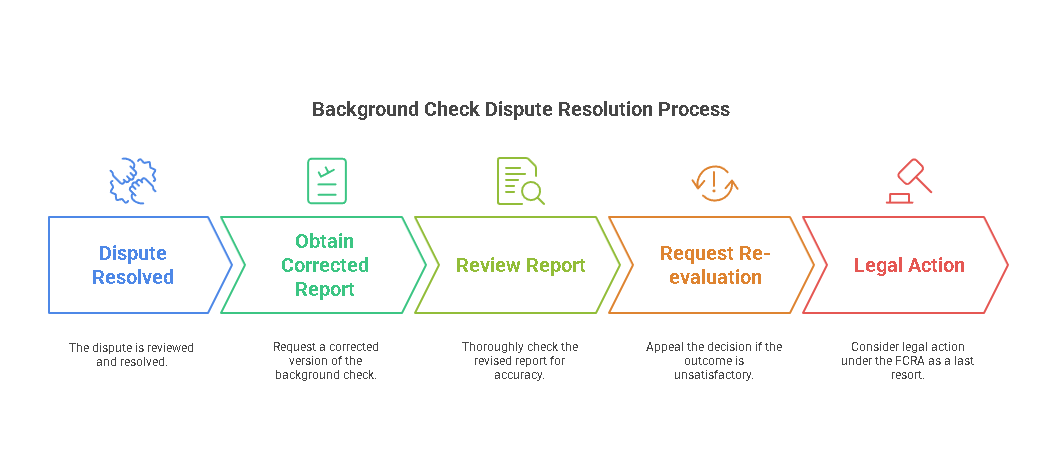
Once the dispute has been reviewed and resolved, the next steps involve ensuring that the corrected background check is reflected in any future screenings or reports. Here are the final steps:
- Obtain a Copy of the Corrected Report: After the dispute has been resolved, ask the agency for a corrected version of your background check. This ensures that any inaccuracies have been removed and that your report is up-to-date. Be sure to review the revised report thoroughly to ensure that all errors have been addressed.
- Request Re-evaluation or Appeal (if applicable): If the dispute is not resolved in your favor or if the background check company refuses to make the necessary corrections, you may request a re-evaluation or appeal the decision. This may involve providing additional documentation or presenting your case in a more formal manner. Some background check companies or agencies will allow individuals to file a secondary appeal if the initial dispute is unsuccessful.
- Legal Action (as a Last Resort): If all else fails, individuals may pursue legal action. This could involve filing a lawsuit under the Fair Credit Reporting Act (FCRA), which protects consumers from inaccurate or outdated background check reports. Before taking legal action, it’s advisable to consult with an attorney who specializes in consumer protection or employment law to ensure that you understand your rights and options.
How Precisehire Can Assist with Criminal Background Check Disputes
Precisehire offers a wide range of services designed to help employers and individuals navigate the criminal background check process. As a trusted provider of background screening services, Precisehire can help both individuals and employers ensure that the information included in background checks is accurate, up-to-date, and legally compliant.
- Background Check Accuracy: Precisehire works with employers to ensure that all criminal background checks are comprehensive and error-free. By using advanced technology and the latest databases, Precisehire helps companies ensure that they’re making informed hiring decisions without the risk of relying on inaccurate or outdated information.
- Assistance with Disputes: In addition to providing accurate background screening services, Precisehire also offers dispute resolution services. If you’re an employer or an individual facing a criminal background check dispute, Precisehire can assist by facilitating the process, ensuring that all necessary documentation is submitted, and helping to communicate with agencies effectively.
- Compliance and Legal Guidance: Precisehire also helps companies comply with laws governing background checks, such as the Fair Credit Reporting Act (FCRA) and local regulations. For employers, ensuring that your background screening processes are legally sound is crucial to avoiding potential legal risks.
- Comprehensive Screening Solutions: Whether you’re an employer conducting background checks on potential hires or an individual concerned about a background check dispute, Precisehire offers customized solutions that help navigate the complexities of criminal background checks. Their experienced team can guide you through the entire process, ensuring that both employees and employers are fully informed and compliant.
By utilizing services from Precisehire, both employers and individuals can benefit from professional expertise and reliable background screening, reducing the potential for errors and disputes.
Ensuring Accurate Criminal Records
The process of disputing a criminal background check may seem daunting, but by following the steps outlined above, individuals can ensure that their criminal history is reported accurately. Whether you’re facing mistaken identity, outdated information, or inaccurate charges, the right approach can lead to a swift resolution.
By keeping records up-to-date, understanding the dispute process, and leveraging the assistance of experts like Precisehire, individuals can navigate the criminal background check process with greater ease. In the next section, we will discuss the legal aspects of disputing a criminal background check, common frequently asked questions (FAQs), and offer further insights into how to ensure your background check remains accurate.
Legal Aspects of Disputing a Criminal Background Check
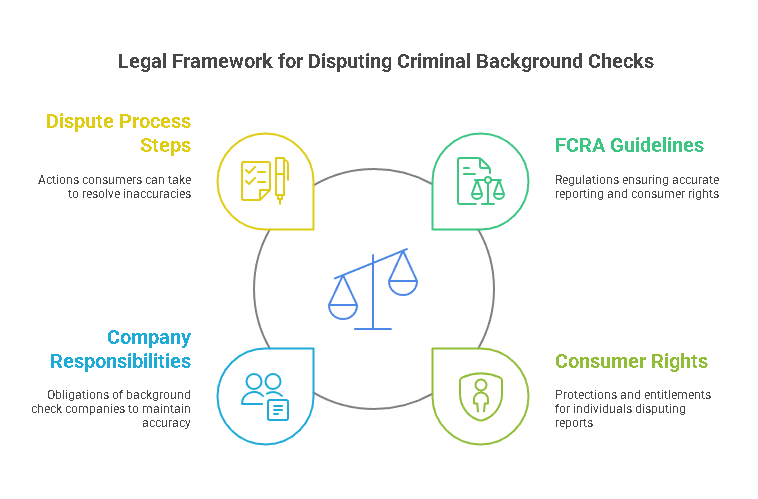
When disputing a criminal background check, it’s important to be aware of the legal rights and responsibilities involved. In many countries, there are strict regulations governing how criminal background checks are conducted and how disputes should be handled. In the United States, the Fair Credit Reporting Act (FCRA) plays a key role in protecting individuals’ rights during the dispute process. Below, we’ll explore the legal framework surrounding criminal background checks, the responsibilities of both consumers and background check companies, and the steps individuals can take if their dispute is not handled properly.
The Fair Credit Reporting Act (FCRA)
The Fair Credit Reporting Act (FCRA) is a federal law in the United States that regulates how credit reporting agencies, consumer reporting agencies, and other companies use personal information. One of the most important aspects of the FCRA for individuals disputing a criminal background check is that it provides protections related to the accuracy and completeness of consumer reports.
Under the FCRA, if a consumer believes that a criminal background check contains inaccurate or incomplete information, they have the right to dispute the report. The law outlines specific requirements for how background check companies must handle these disputes:
- Timeframe for Dispute Resolution:
- The FCRA requires that once a consumer disputes a criminal background check, the company must investigate the dispute and resolve it within 30 days.
- If the company finds the dispute to be valid, they must correct the report and notify any entities that received the inaccurate report.
- Right to a Free Report:
- Consumers have the right to request a free copy of their criminal background check if it was used to make a decision that negatively affects them, such as employment denial. This can be especially useful if you’re unsure about the accuracy of the information or need to review the details before disputing the report.
- Legal Action for Inaccurate Reports:
- If a criminal background check company fails to investigate a dispute or refuses to correct an inaccurate report, consumers have the right to take legal action. Individuals may file complaints with the Consumer Financial Protection Bureau (CFPB) or even pursue a lawsuit if their rights are violated under the FCRA.
The FCRA also requires background check companies to have procedures in place to ensure that the information they report is accurate. This includes conducting regular audits and following strict guidelines for verifying data before including it in reports.
The Role of Background Check Companies
Background check companies are required by law to maintain accurate records and report only information that is current, complete, and legally obtained. When an individual disputes their criminal background check, the company has the following responsibilities:
- Thorough Investigation:
- Once a dispute is filed, the background check company must thoroughly investigate the claim. This investigation often involves contacting the agency or entity responsible for the original data, such as local law enforcement, courts, or other public records databases.
- Timely Correction of Errors:
- If the background check company determines that there was an error in the report, they are legally obligated to correct it. This might involve removing incorrect charges, updating outdated information, or ensuring that sealed or expunged records are not included.
- Notification of Updates:
- After resolving a dispute, the company must notify both the consumer and any employers or organizations that previously received the inaccurate report. This ensures that the updated background check information is distributed to all relevant parties.
What to Do if Your Dispute Is Not Resolved in Your Favor
If you’ve gone through the dispute process and your criminal background check dispute is not resolved in your favor, there are several steps you can take:
- Request an Appeal:
- In some cases, background check companies will allow consumers to appeal their dispute decision. This usually involves providing additional documentation or clarifying information that could help resolve the issue.
- File a Complaint with the Consumer Financial Protection Bureau (CFPB):
- The CFPB is a government agency that helps consumers resolve disputes with financial companies, including background check companies. If you feel that your dispute was not handled properly or that your rights were violated, you can file a complaint with the CFPB. The agency will review your case and, in some instances, intervene to ensure compliance with the law.
- Take Legal Action:
- As a last resort, if your dispute is still unresolved and you believe that the background check company has violated your rights under the FCRA, you can take legal action. Consulting with an attorney who specializes in consumer protection or employment law is advisable. They can guide you through the process of filing a lawsuit and help you seek compensation for any damages you incurred due to the inaccuracies in your background check.
Frequently Asked Questions (FAQs)
How Do I Dispute a Criminal Background Check If I Believe It Is Incorrect?
To dispute a criminal background check, first identify which company or agency provided the report. You can usually find this information on the background check itself. Once you’ve identified the provider, gather supporting documentation that proves the error (such as court records or official letters) and follow the dispute process outlined by the company. This may involve submitting the dispute online or via mail. Be sure to include all relevant case numbers, dates, and supporting evidence.
How Long Does It Take to Resolve a Criminal Background Check Dispute?
The timeline for resolving a criminal background check dispute can vary. In most cases, background check companies are required to investigate the dispute and resolve it within 30 days. However, this timeframe can be longer if the dispute involves multiple agencies or requires additional documentation. Always follow up with the company if you have not received a resolution within the expected timeframe.
What Should I Do If My Criminal Background Check Shows Inaccurate Charges?
If your criminal background check includes charges that are inaccurate or outdated, you should begin the dispute process as soon as possible. Contact the background check company and provide supporting documentation, such as court records or police reports, that prove the charges are incorrect. If necessary, consult with an attorney or consumer protection agency to ensure that your rights are upheld.
Can I Still Be Hired If My Criminal Background Check Is Disputed?
Yes, you can still be hired while disputing a criminal background check. However, this depends on the employer’s policies and whether the background check is a determining factor in their hiring decision. Some employers may choose to wait until the dispute is resolved before making a final decision. It's important to communicate with the employer and let them know about the dispute to avoid any misunderstandings.
What Steps Should I Take If My Dispute Is Not Resolved in My Favor?
If your dispute is not resolved in your favor, you can appeal the decision with the background check company or file a complaint with the Consumer Financial Protection Bureau (CFPB). If those steps do not work, you may consider pursuing legal action under the Fair Credit Reporting Act (FCRA). It’s important to consult with an attorney if you plan to take this route, as legal advice will be crucial in navigating the process.
Conclusion
Disputing a criminal background check can be a complex and frustrating process, but it is an important step to ensure that your records are accurate and up-to-date. By following the steps outlined in this article, individuals can better navigate the dispute process and protect their rights under the Fair Credit Reporting Act (FCRA). Additionally, Precisehire offers valuable support to both employers and individuals seeking accurate background checks, ensuring that any discrepancies are addressed promptly and efficiently.
If you’re ever unsure about how to handle a criminal background check dispute, remember that help is available. Utilizing services like Precisehire can make the process easier and provide peace of mind. Ensuring that your criminal record is accurate is essential for your career, housing opportunities, and overall peace of mind. Take proactive steps today to resolve any discrepancies in your criminal background check and move forward with confidence.
